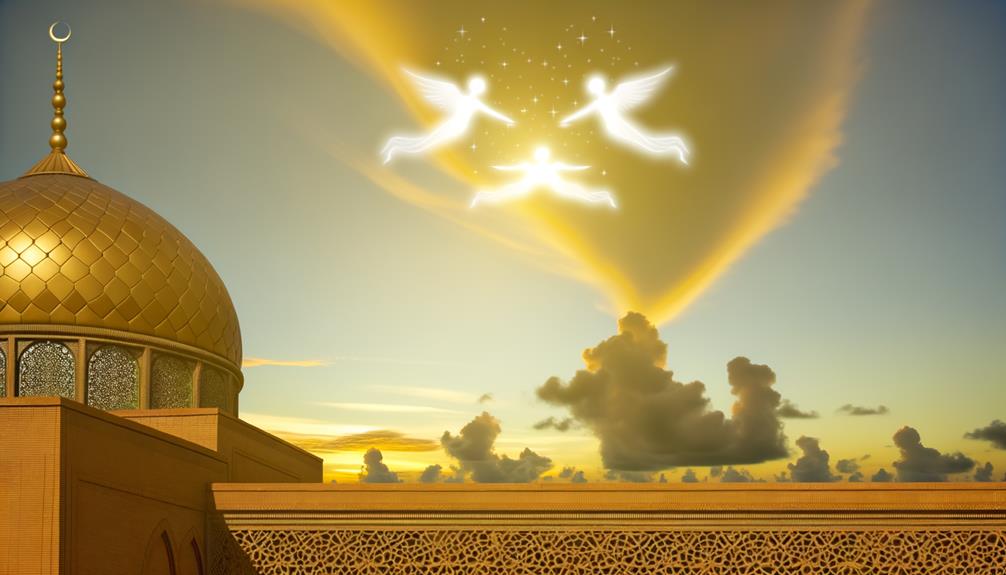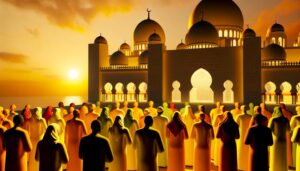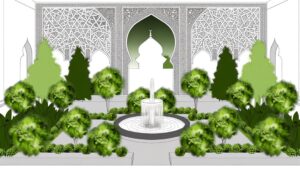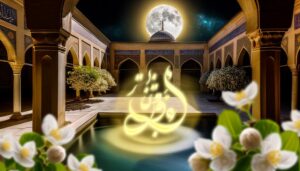Michael Name Meaning in Islam
In Islam, the name Michael, referred to as Mikail, derives from the Hebrew name Mikha'el, meaning 'Who is like God?'. Mikail is an esteemed archangel in Islamic tradition, mentioned in the Quran and renowned for his obedience to Allah.
He is believed to play an essential role in providing nourishment and ensuring the sustenance of life, representing cosmic balance and divine mercy. Mikail works alongside other angels to implement God's will and is considered a guardian of the faithful.
The cultural influence of Michael extends to naming practices, literature, and art within Islamic communities. To grasp a deeper understanding of Mikail's significance, there's much more to uncover.

Key Takeaways
- The name Michael is derived from the Hebrew Mikha'el, meaning 'Who is like God?'.
- In Islam, Michael is known as Mikail and is revered as an archangel.
- Archangel Michael is entrusted with providing nourishment and ensuring the sustenance of life.
- Michael symbolizes divine protection, guidance, mercy, and cosmic balance in Islamic tradition.
- The name Michael is less common in predominantly Muslim countries but more frequent in cosmopolitan urban centers.
Origin of the Name Michael
The name Michael, derived from the Hebrew name Mikha'el, has ancient origins that can be traced back to the Hebrew Bible and other religious texts. The name Mikha'el translates to 'Who is like God?' and is often interpreted as a rhetorical question underscoring the unparalleled nature of the divine.
In the Hebrew Bible, Michael is one of the archangels, playing a pivotal role as a protector and leader of the heavenly host. This name holds significant historical and theological weight, appearing in the Book of Daniel, the Book of Revelation, and other canonical scriptures.
Its enduring presence across various religious traditions underscores its profound spiritual and cultural resonance, marking it as a name of considerable import.
Michael in Islamic Texts
In Islamic texts, the name Michael, referred to as Mikail in Arabic, is mentioned in the Quran.
Angel Michael holds a significant role as one of the chief angels, responsible for providing nourishment to human bodies and souls.
His duties are seen as crucial to the sustenance of life, making him an essential figure in Islamic theology.
Michael in Quran
Michael, known as Mikail in Islamic tradition, is referenced in the Quran as one of the archangels who plays an essential role in the divine order and execution of God's commands. Specifically mentioned in Surah Al-Baqarah (2:98), Mikail, along with Jibril (Gabriel), is affirmed as a significant figure in the celestial hierarchy.
The Quran emphasizes the importance of these archangels, marking them as embodiments of divine will. Mikail is revered for his steadfast obedience to Allah and for his role in administering various aspects of the cosmos. This reverence is echoed in Islamic exegesis and the Hadith literature, where Mikail's duties and attributes further underscore his esteemed position within Islamic theology.
Angel Michael's Role
As one of the principal archangels in Islamic tradition, Mikail holds a central role in executing divine mandates and overseeing the natural order. His responsibilities encompass various aspects essential for maintaining balance in the universe.
Among his key duties are:
- Provision of Sustenance: Mikail is entrusted with the distribution of sustenance (rizq), ensuring that all creatures receive their nourishment.
- Weather Regulation: He governs the elements, such as rain and wind, which are vital for agricultural prosperity and ecological balance.
- Divine Assistance: Mikail aids the faithful, providing them with spiritual support and comfort during times of hardship.
- Prayer for Believers: He intercedes for those who sincerely seek forgiveness and work diligently to follow the righteous path.
These roles underscore Mikail's integral function in the divine scheme.
Role of Archangel Michael
Central to Islamic tradition, Archangel Michael (Mikail) is revered as a powerful figure responsible for providing nourishment and guiding the natural elements. He plays a pivotal role in ensuring the sustenance of life by overseeing the distribution of rain and other forms of divine mercy.
According to Islamic teachings, Mikail works closely with other angels to implement God's will on Earth, especially in matters related to the environment and human sustenance. His responsibilities extend to ensuring that the natural world operates harmoniously, reflecting the divine order.
Symbolism of Michael
Beyond his vital role in administering divine sustenance, the Archangel Michael symbolizes the profound connection between divine providence and the natural world in Islamic tradition. His imagery is rich and multifaceted, reflecting the depth of his spiritual significance:
- Guardian of the Faithful: Michael is seen as a protector, ensuring the safety and spiritual well-being of believers.
- Harbinger of Mercy: His presence is often associated with divine mercy and compassion, showering blessings upon the Earth.
- Cosmic Balance: Michael represents the equilibrium between the celestial and earthly domains, maintaining harmony in the universe.
- Manifestation of Power: His role as an angelic warrior underscores divine strength and justice, defending the righteous against evil forces.
This symbolism highlights Michael's integral role within the cosmic order.
Michael and Other Archangels
In Islamic tradition, Michael is one of several archangels, each of whom fulfills distinct and significant roles in the maintenance of the divine order. Known as Mikail in Arabic, Michael is entrusted with the responsibility of providing nourishment to human bodies and souls, overseeing rain and natural elements.
Alongside Michael, other prominent archangels include Jibril (Gabriel), who is the messenger of divine revelations, Israfil, who will blow the trumpet to mark the Day of Judgment, and Azrael, the angel of death who takes souls at their appointed time.
Together, these archangels operate under the direct command of Allah, ensuring the execution of divine will and the smooth functioning of the cosmos according to Islamic beliefs.
Cultural Influence of Michael
The reverence for Michael in Islamic tradition extends beyond his celestial duties, permeating various aspects of cultural and religious practices across the Muslim world.
This cultural influence manifests in several distinct ways:
- Names and Naming: Many Muslims name their children after Michael (Mikail), reflecting the angel's esteemed status.
- Literature and Poetry: Islamic literature often references Michael, highlighting his role and virtues.
- Daily Prayers: References to Michael can be found in certain prayers, asking for his intercession and protection.
- Festivals and Rituals: Some Islamic rituals and festivals incorporate elements honoring Michael, emphasizing his importance in the spiritual hierarchy.
These practices underscore Michael's profound cultural significance, deeply woven into the fabric of Islamic life and tradition.
Michael in Islamic Art
Islamic art, with its rich tapestry of symbolism and tradition, often features depictions and motifs inspired by the angel Michael (Mikail), illustrating his revered position in Islamic cosmology. Michael is frequently associated with natural elements such as rain and sustenance, which are depicted through intricate designs and calligraphy in various Islamic artworks. His role as a protector and provider is symbolized through specific artistic elements, enhancing the spiritual significance of the pieces.
| Artistic Element | Symbolism |
|---|---|
| Calligraphy | Divine communication |
| Geometric Patterns | Infinite nature of Allah |
| Floral Motifs | Paradise and sustenance |
| Colors (Blue, Green) | Spirituality and life |
| Miniature Paintings | Representation of angels |
These elements collectively highlight Michael's integral presence in Islamic art.
Modern Relevance of Michael
In contemporary times, the name Michael continues to hold significant relevance among Muslims, reflecting its enduring spiritual and cultural resonance.
Additionally, Michael serves as a bridge in interfaith dialogues, fostering mutual respect and understanding among different religious communities.
This section examines how these modern perspectives shape the continued appreciation of the name Michael within the Islamic context.
Popularity Among Muslims
Throughout contemporary Muslim communities, the name Michael has seen varying degrees of acceptance and relevance. Its popularity is influenced by various factors:
- Cultural Integration: In regions with significant interaction between Muslim and Western societies, the name Michael finds moderate acceptance due to cultural blending.
- Religious Significance: Recognized as an archangel in Islamic tradition, some Muslims choose the name Michael (Mikail in Arabic) for its religious connotation.
- Modern Trends: Globalization has led to the adoption of diverse names, including Michael, among younger Muslim parents seeking modern yet meaningful names.
- Geographical Variations: In predominantly Muslim countries, the name Michael is less common, whereas in cosmopolitan urban centers, its occurrence is more frequent.
This nuanced popularity reflects the dynamic interplay between tradition and modernity.
Interfaith Perspectives on Michael
Michael's significance transcends religious boundaries, serving as a point of reverence in both Islamic and Christian traditions, which underscores the name's broad interfaith resonance.
In Islam, Michael (Mikail) is an archangel responsible for providing nourishment and guiding souls towards righteousness. Similarly, in Christianity, Michael is revered as a protector and leader of heavenly armies against evil. This shared veneration highlights Michael as a unifying figure, fostering mutual respect between the faiths.
In modern contexts, the name Michael often symbolizes divine protection, strength, and guidance, resonating with diverse communities. As a result, Michael continues to hold contemporary relevance, embodying values that transcend individual religious doctrines and encourage a spirit of interfaith harmony and understanding.
Conclusion
In Islamic tradition, the name Michael, or Mikail, is imbued with profound significance, much like a beacon illuminating the path of righteousness. His role as an archangel underscores his importance in divine operations, symbolizing mercy and sustenance.
The cultural and artistic representations of Michael reflect his enduring legacy across various Islamic societies. This rich tapestry of meanings and influences guarantees that the reverence for Michael remains an essential aspect of Islamic belief and practice.






